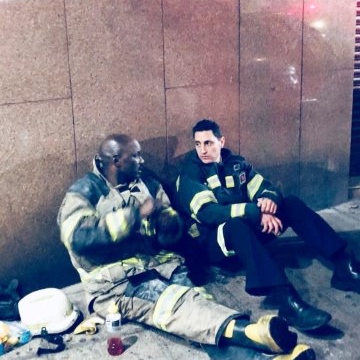
SA

Downtown Joburg fire – When the rescuers need rescuing
NICOLA MILTZ
Zaka SA is a Jewish rescue and recovery organisation that unites communal teams involved in search and rescue, security, and burial. It comprises members of the Community Security Organisation (CSO), Chevrah Kadisha, Hatzolah, and Ezra, all highly skilled volunteers who work together to deal with complex situations.
When Hatzolah’s Medical Manager, Yudi Singer, 30, arrived at the burning Lotus Building in downtown Johannesburg two weeks ago, he was expecting to put his firefighting and paramedic skills to use, as well as hand out food to weary firefighters. Instead Singer, who is also a member of Zaka SA, found himself facing a different emergency.
He didn’t go rushing into the smouldering building to assist hardworking firefighters from the City of Johannesburg, Ekurhuleni, Tshwane, and the Airports Company of South Africa. Instead, Singer realised his skills would be better utilised in “rescuing” the rescuers themselves.
He noticed a firefighter slumped against the wall near the makeshift rehabilitation area. He quickly recognised him as Freddie Morukhu, the commander of the Northview Fire Station. Morukhu is Singer’s superior, and the commander at the fire station where he works. “The only word I can use to describe his appearance was broken,” Singer told his colleagues at Zaka.
Morukhu, one of the city’s most experienced and lauded firemen, who is the station commander for several stations in Johannesburg, had been battling the inferno for hours, said Singer. Three firefighters died after the fire broke out on the 23rd floor on Wednesday, 5 September. They were his men. His heart was broken.
Singer automatically switched gear. “It was a case of the rescuers needing rescuing,” he told the SA Jewish Report.
“Tonight [Thursday 6 September] several of us [from Zaka and the South African Jewish Board of Deputies] went to hand out food and supplies to the firefighters involved in the structural fire in the CBD. Once there, it became pretty clear that there was probably a greater need for psychological first aid.”
When Singer got home that night, he penned some of his experiences. He wanted to share them with members of Hatzolah’s Crisis Response Unit (CRU), recently formed to offer psychological first aid.
Singer explained to his colleagues how he had sat with Morukhu on the pavement. He watched the tears roll down Morukhu’s cheeks as he recounted the traumatic events of the past 24 hours.
Desperate to offload what he had witnessed and experienced, Morukhu shared what he had seen.
Other firefighters on the scene also expressed disbelief about their fallen colleagues, and anguish about how to handle three funerals emotionally.
“Morukhu kept speaking about how terrible he felt, and how he was dreading having to present the deceased firefighters’ helmets to the families. He didn’t know how he was going to be able to console them,” said Singer.
Singer offered an empathetic ear.
“This grown man… experienced his worst day. He was struggling with planning logistics. He was absolutely shattered, physically and emotionally. He was physically too tired to stand or eat, and emotionally so drained. This is a man from whom I learn and take orders, and here I was sitting, trying to assist him.”
That night, members of Zaka were alerted by the city’s disaster management teams that food and supplies were needed. Zaka is an international rescue and recovery organisation based out of Jerusalem with branches all over the world.
Many of the volunteers are doctors, paramedics, rabbis, and business people who can be called upon at any time when there is an emergency or crisis.
In South Africa, Zaka works closely with the heads of the province’s disaster management teams and with other nongovernmental organisations involved in crisis and relief management.
Daniel Forman, the head of Zaka SA, explained that Zaka was called in to help provide food for 100 firefighters. “Food is not our speciality, so we turned to the South African Jewish Board of Deputies (SAJBD), who immediately jumped on board,” he said.
Zaka and the SAJBD realised when they reached the scene that more food was urgently required to feed 700 students, who had been evacuated from a nearby building for fear of smoke inhalation.
“There is an unbelievable impact when the community works together in a crisis situation. Feeding 700 people at short notice in a stressful situation was truly remarkable. Zaka alone could not have addressed this need.”
A community member who wished to remain anonymous said, “We don’t hear about the way our boys work side by side. It’s incredible how they offer support beyond the Jewish community. It’s social cohesion at its finest. The community knows only half of what our guys do and how well trained they are. These are the community’s true heroes.”




